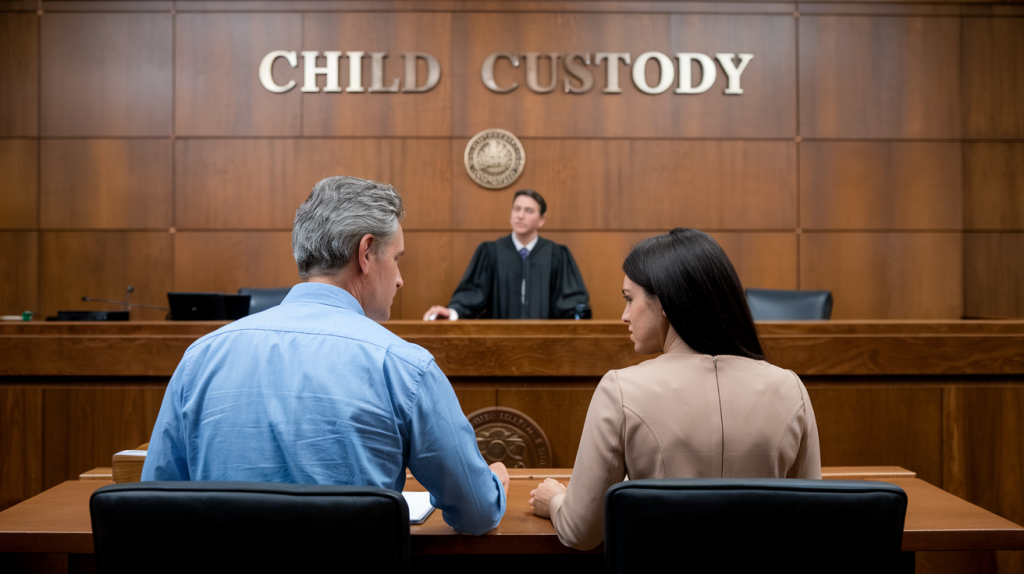Facing a custody battle is hard enough.
When false allegations enter the picture, the situation becomes even more difficult. Many parents feel lost and scared when untrue claims threaten their relationship with their children.
False allegations can shake a parent’s world. However, there are ways to protect both parents and children during this challenging time. The right approach can help address these claims properly while keeping children’s best interests in focus.
This Blog will share proven ways to handle false allegations in custody battles.
Parents will learn about gathering evidence, working with legal professionals, and maintaining composure throughout the process.
Let’s look at how to protect parental rights and parent-child relationships.

Every parent has legal rights when facing untrue claims in custody cases. These rights include presenting evidence, challenging statements, and defending against false accusations. The law protects parents from baseless claims that could harm their relationship with their children.
Parents can request detailed information about any allegations made against them. They have the right to know who made the claims and when these claims were filed. This information helps build a strong defense.
Legal representation is another key right. Parents can choose their own lawyer to help fight false allegations. A lawyer will explain all available options and create a plan to protect the parent-child bond.
The court must hear both sides of the story. No decisions should be made based on claims alone – there must be proof. Parents have the right to question witnesses and bring their own witnesses to support their case.
Time with children remains protected during this process. Unless there’s clear proof of danger, parents can usually maintain their current custody schedule while fighting false claims.
How to Fight False Allegations in Child Custody Cases
When facing false claims in a custody case, staying calm and taking measured steps is essential. Here’s what parents can do to address untrue allegations:
1. Document Everything

Record-keeping becomes your strongest defense against false claims. Keep a log of every contact with your child and the other parent, and save all text messages and emails – don’t delete anything, even if it seems small.
Take notes after phone calls, writing down what was said and when. Keep a folder with school report cards, medical checkup notes, and activity schedules, as these papers show your regular involvement in your child’s life.
Make copies of everything and store them in two places. Put one set at home and another in a safe spot, like a trusted friend’s house or a bank box. Digital files should have backups, too.
2. Work With Your Attorney

Meet with a family law attorney as soon as possible. Share the whole story – both good parts and bad, bring all your records and explain the background of the situation.
Your attorney needs to know about past events that might come up. Tell them about witnesses who can speak about your parenting so that they can plan the next steps and set up a clear timeline.
Regular updates with your lawyer matter, too. Send new records as you get them, and then ask questions when you’re not sure what to do next.
3. Get Professional Support

Reach out to people who see your parenting firsthand. Your child’s teachers can talk about school involvement, doctors know about medical appointments and care decisions, and counselors understand family dynamics.
Ask these professionals for written statements about their observations, as they can describe how you handle parental responsibilities. Their words carry weight because they work with families every day.
Keep a list of people willing to speak on your behalf. Include their contact details and what they know about your situation.
4. Stay Professional

Every message and meeting matters now, so write emails like they might be read in court someday – because they might be. Keep the topic on your children and leave emotions out.
Wait before sending responses when you feel upset. Read everything twice before hitting send. Use simple, clear words that focus on facts rather than feelings.
Set up a separate email account just for parent communication. This helps keep records organized and shows you take the process seriously.
5. Follow Court Orders

Meeting court requirements shows good faith. Get a calendar, mark all court dates, meetings, deadlines, and show up early to prove reliability.
Complete required classes or meetings on time. Keep certificates and proof of attendance, and make sure your lawyer has copies of everything you finish.
Pay any required fees promptly and Follow visiting schedules exactly as written. Being punctual and prepared helps build trust with the court.
Reasons for Making False Allegations in a Custody Dispute
During custody disputes, parents sometimes make false claims against each other. This often happens because of strong emotions and stress. Some parents worry about losing time with their children and act out of fear.
Money and control can play a big role, too. A parent might make false claims, hoping to gain more custody time or reduce support payments. Others may feel hurt by the relationship’s end and seek payback through false statements.
Some parents believe their concerns are real, even when they’re not. Their worries about their children’s safety might lead them to misread normal situations as dangers. Stress can make people see problems that don’t exist.
Mental health issues can also lead to false claims. The pressure of court battles might cause someone to lose perspective and make untrue statements. Understanding these reasons helps create better ways to handle such claims.
What Will a Court Do When Provided with False Accusations

Courts take all allegations in child custody cases seriously. Their top priority is ensuring the child’s safety and well-being. When someone brings forward accusations, the court must examine them carefully.
The legal system follows specific steps to check these claims. First, they order an investigation into the allegations. This process might include interviews with parents, the children, and other relevant people. They may also ask for school records, medical reports, or other documents.
The court can take several actions if they find the accusations are false:
- They might change the custody arrangement to give more time to the wrongly accused parent. This shows how false claims can backfire on the person making them.
- The judge may order the accusing parent to pay legal fees and court costs. These expenses can add up to significant amounts.
- Some courts require the accused parent to attend counseling or parenting classes. This helps prevent similar situations in the future.
Remember, courts value honesty. Making false statements under oath is against the law. The legal system aims to protect children while being fair to both parents.
Consequences of False Allegations Made in Custody Cases
False allegations in custody cases can have serious consequences, both legally and emotionally. Here’s an overview of the impact:
- Legal Ramifications: False accusations can lead to legal penalties, including contempt of court charges or sanctions against the accuser. The court may also view the individual as dishonest, which could harm their credibility in future proceedings.
- Custody Implications: If the allegations are proven false, the accused parent may gain full or increased custody, while the accuser may face reduced visitation or custody rights.
- Emotional Harm: False allegations can cause significant emotional distress for the falsely accused, leading to strained relationships, stress, and even damage to reputation. It can also cause harm to the children involved, as they may experience confusion or be caught in the middle of the dispute.
- Damage to Parental Relationships: False claims can permanently damage the relationship between the co-parents, making future cooperation difficult or impossible.
- Impact on Children: If false allegations are made, the child may experience emotional turmoil, feeling torn between both parents or confused by the situation, potentially leading to long-term psychological consequences.
Protecting your rights during a custody battle is essential, and if false allegations are made, working with a family law attorney is crucial to go through the legal complexities and safeguard your relationship with your child.
Conclusion
False claims in custody battles feel like a punch to the gut.
But guess what? You’re stronger than you think. Think of yourself as a careful collector – gathering proof, saving messages, and building your case piece by piece.
It’s like putting together a puzzle where every document tells part of your story.
Do you know what makes judges pay attention? Facts. Not loud voices or stories – just solid, simple truth.
You’re not just defending yourself in this trial; you’re showing your kids what standing up for the truth looks like.
By following these steps and staying focused on your child’s well-being, you build a strong foundation for your case.








